泰勒科学管理原理(英文版)
- 格式:doc
- 大小:247.50 KB
- 文档页数:63
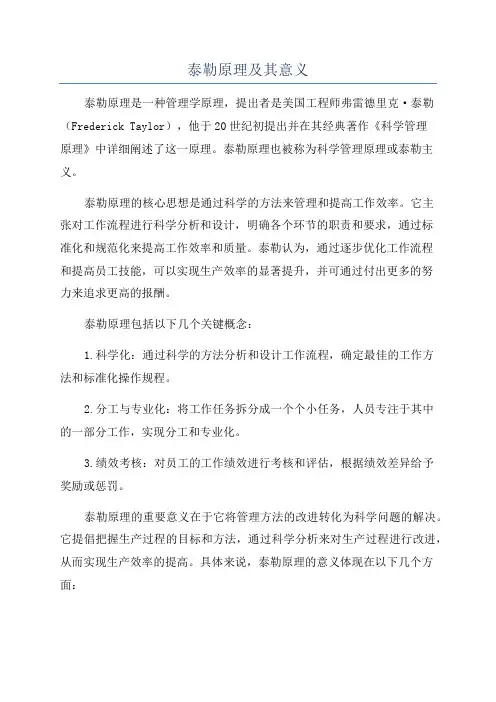
泰勒原理及其意义泰勒原理是一种管理学原理,提出者是美国工程师弗雷德里克·泰勒(Frederick Taylor),他于20世纪初提出并在其经典著作《科学管理原理》中详细阐述了这一原理。
泰勒原理也被称为科学管理原理或泰勒主义。
泰勒原理的核心思想是通过科学的方法来管理和提高工作效率。
它主张对工作流程进行科学分析和设计,明确各个环节的职责和要求,通过标准化和规范化来提高工作效率和质量。
泰勒认为,通过逐步优化工作流程和提高员工技能,可以实现生产效率的显著提升,并可通过付出更多的努力来追求更高的报酬。
泰勒原理包括以下几个关键概念:1.科学化:通过科学的方法分析和设计工作流程,确定最佳的工作方法和标准化操作规程。
2.分工与专业化:将工作任务拆分成一个个小任务,人员专注于其中的一部分工作,实现分工和专业化。
3.绩效考核:对员工的工作绩效进行考核和评估,根据绩效差异给予奖励或惩罚。
泰勒原理的重要意义在于它将管理方法的改进转化为科学问题的解决。
它提倡把握生产过程的目标和方法,通过科学分析来对生产过程进行改进,从而实现生产效率的提高。
具体来说,泰勒原理的意义体现在以下几个方面:1.提高生产效率:泰勒原理的核心目标是提高生产效率,通过分析工作流程、设定工作标准和培训员工等措施,可以降低工作成本、减少生产时间、提高产品质量和数量。
这对企业来说具有重要的经济效益。
2.优化工作流程:泰勒原理倡导科学的方法来分析工作流程,通过剔除无效操作、合理分配工作任务和引入先进技术等措施,可以优化工作流程,减少重复劳动、交叉操作和浪费,提高工作效率。
3.提高员工技能:泰勒原理强调员工的专业化和培训重要性,通过分配合适的工作任务,提供必要的培训和技能提升机会,可以提高员工的工作技能和专业素质,增强员工的工作满意度和参与度。
4.实现标准化和规范化:泰勒原理倡导制定和实施标准化工作方法和操作规程,以实现工作过程的可重复性和可量化性。
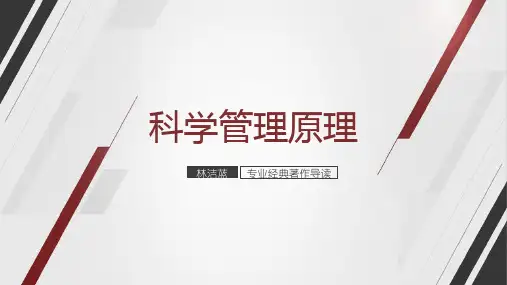
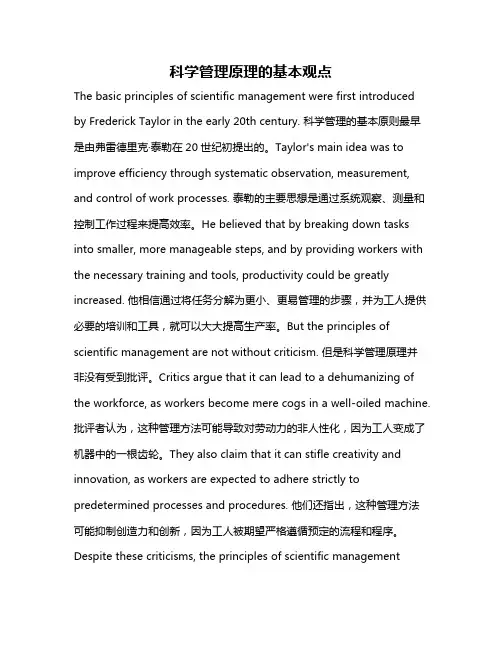
科学管理原理的基本观点The basic principles of scientific management were first introduced by Frederick Taylor in the early 20th century. 科学管理的基本原则最早是由弗雷德里克·泰勒在20世纪初提出的。
Taylor's main idea was to improve efficiency through systematic observation, measurement, and control of work processes. 泰勒的主要思想是通过系统观察、测量和控制工作过程来提高效率。
He believed that by breaking down tasks into smaller, more manageable steps, and by providing workers with the necessary training and tools, productivity could be greatly increased. 他相信通过将任务分解为更小、更易管理的步骤,并为工人提供必要的培训和工具,就可以大大提高生产率。
But the principles of scientific management are not without criticism. 但是科学管理原理并非没有受到批评。
Critics argue that it can lead to a dehumanizing of the workforce, as workers become mere cogs in a well-oiled machine. 批评者认为,这种管理方法可能导致对劳动力的非人性化,因为工人变成了机器中的一根齿轮。
They also claim that it can stifle creativity and innovation, as workers are expected to adhere strictly to predetermined processes and procedures. 他们还指出,这种管理方法可能抑制创造力和创新,因为工人被期望严格遵循预定的流程和程序。
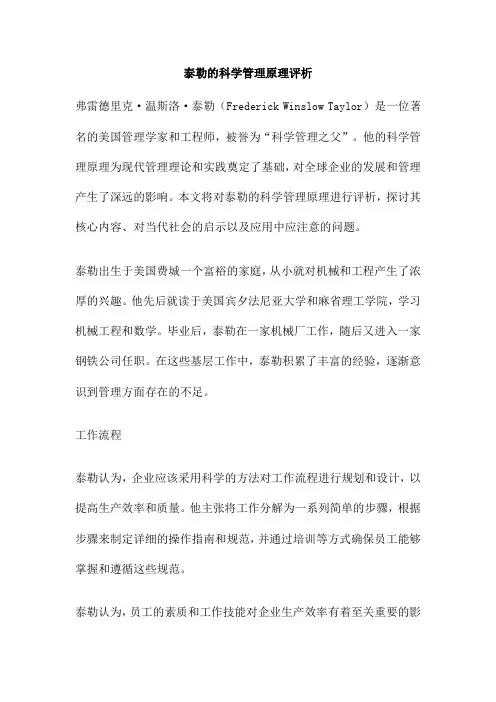
泰勒的科学管理原理评析弗雷德里克·温斯洛·泰勒(Frederick Winslow Taylor)是一位著名的美国管理学家和工程师,被誉为“科学管理之父”。
他的科学管理原理为现代管理理论和实践奠定了基础,对全球企业的发展和管理产生了深远的影响。
本文将对泰勒的科学管理原理进行评析,探讨其核心内容、对当代社会的启示以及应用中应注意的问题。
泰勒出生于美国费城一个富裕的家庭,从小就对机械和工程产生了浓厚的兴趣。
他先后就读于美国宾夕法尼亚大学和麻省理工学院,学习机械工程和数学。
毕业后,泰勒在一家机械厂工作,随后又进入一家钢铁公司任职。
在这些基层工作中,泰勒积累了丰富的经验,逐渐意识到管理方面存在的不足。
工作流程泰勒认为,企业应该采用科学的方法对工作流程进行规划和设计,以提高生产效率和质量。
他主张将工作分解为一系列简单的步骤,根据步骤来制定详细的操作指南和规范,并通过培训等方式确保员工能够掌握和遵循这些规范。
泰勒认为,员工的素质和工作技能对企业生产效率有着至关重要的影响。
他主张对员工进行系统的培训,提高他们的技能和素质,以便让他们更好地适应工作环境和完成任务。
同时,泰勒还强调了员工参与决策的重要性,认为这可以提高员工的积极性和工作效率。
泰勒认为,材料和设备的有效利用是提高生产效率的关键。
他主张通过精确的计算和规划,确定材料和设备的最佳使用方式,避免浪费。
同时,他还提出了“时间研究”的概念,通过科学的方法对工作流程进行计时,以便找出生产过程中的瓶颈和浪费,并采取相应的措施进行改进。
重视时间和效率泰勒的科学管理原理的核心是提高生产效率和产品质量,这一思想对当代社会的管理实践仍然具有重要的借鉴意义。
在当今竞争激烈的市场环境下,企业需要不断提高自身的效率和质量,以保持竞争优势。
借鉴泰勒的思想,企业可以通过精细化管理、流程优化等方法,提高工作和资源的利用效率,减少浪费和冗余,实现更高效的生产和更优质的服务。
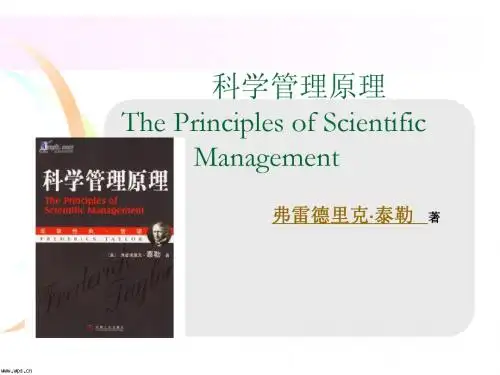
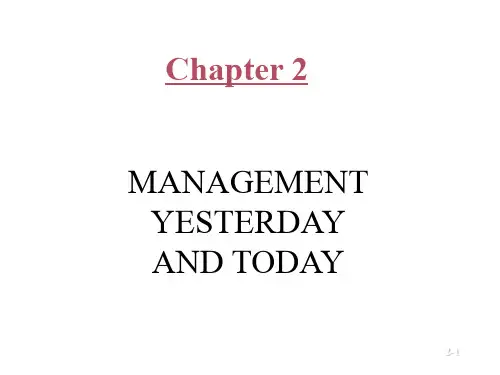
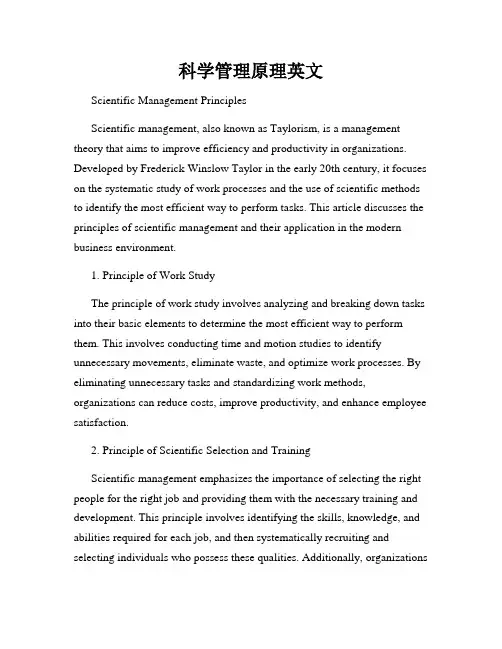
科学管理原理英文Scientific Management PrinciplesScientific management, also known as Taylorism, is a management theory that aims to improve efficiency and productivity in organizations. Developed by Frederick Winslow Taylor in the early 20th century, it focuses on the systematic study of work processes and the use of scientific methods to identify the most efficient way to perform tasks. This article discusses the principles of scientific management and their application in the modern business environment.1. Principle of Work StudyThe principle of work study involves analyzing and breaking down tasks into their basic elements to determine the most efficient way to perform them. This involves conducting time and motion studies to identify unnecessary movements, eliminate waste, and optimize work processes. By eliminating unnecessary tasks and standardizing work methods, organizations can reduce costs, improve productivity, and enhance employee satisfaction.2. Principle of Scientific Selection and TrainingScientific management emphasizes the importance of selecting the right people for the right job and providing them with the necessary training and development. This principle involves identifying the skills, knowledge, and abilities required for each job, and then systematically recruiting and selecting individuals who possess these qualities. Additionally, organizationsshould provide adequate training to ensure that employees have the necessary skills to perform their tasks effectively and efficiently.3. Principle of StandardizationThe principle of standardization involves developing and implementing standardized procedures and methods for performing tasks. By establishing standard operating procedures, organizations can ensure consistency, minimize errors, and improve efficiency. Standardization also facilitates the training of new employees, as they can easily learn and follow established procedures.4. Principle of Division of LaborThe principle of division of labor is based on the idea that breaking down complex tasks into smaller, specialized tasks can improve efficiency and productivity. By assigning specific tasks to individuals who specialize in those areas, organizations can take advantage of their expertise and reduce the time required to complete tasks. This leads to increased efficiency and improved overall performance.5. Principle of Incentives and RewardsScientific management recognizes the importance of providing incentives and rewards to motivate employees and enhance their performance. Taylor advocated for the use of financial incentives, such as piece-rate systems, to reward employees for their productivity. This principle encourages employees to work harder and more efficiently, as they are directly rewarded for their efforts.6. Principle of Functional ForemanshipThe principle of functional foremanship involves separating the planning and execution functions of management. Under this system, each worker is accountable to two supervisors - one responsible for planning and another for execution. This allows for greater specialization and expertise in each area, leading to improved coordination and efficiency.7. Principle of Cooperation between Management and EmployeesScientific management emphasizes the importance of cooperation and collaboration between management and employees. Taylor believed that effective management involved fostering a harmonious working relationship between employers and employees, based on mutual trust and respect. This principle aims to create a positive work environment that enhances employee satisfaction and productivity.In conclusion, scientific management principles provide a framework for maximizing efficiency and productivity in organizations. By applying these principles, businesses can streamline work processes, improve employee performance, and achieve better results. While scientific management has received criticism for its mechanistic approach, many of its principles continue to be relevant and influential in modern management practices.。
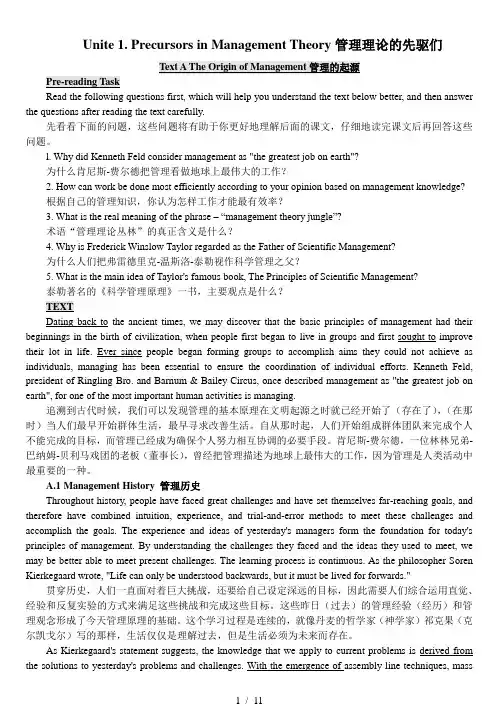
Unite 1. Precursors in Management Theory管理理论的先驱们Read the following questions first, which will help you understand the text below better, and then answer the questions after reading the text carefully.先看看下面的问题,这些问题将有助于你更好地理解后面的课文,仔细地读完课文后再回答这些问题。
l. Why did Kenneth Feld consider management as "the greatest job on earth"?为什么肯尼斯-费尔德把管理看做地球上最伟大的工作?2. How can work be done most efficiently according to your opinion based on management knowledge?根据自己的管理知识,你认为怎样工作才能最有效率?3. What is the real meaning of the phrase –“management theory jungle”?术语“管理理论丛林”的真正含义是什么?4. Why is Frederick Winslow Taylor regarded as the Father of Scientific Management?为什么人们把弗雷德里克-温斯洛-泰勒视作科学管理之父?5. What is the main idea of Taylor's famous book, The Principles of Scientific Management?泰勒著名的《科学管理原理》一书,主要观点是什么?Dating back to the ancient times, we may discover that the basic principles of management had their beginnings in the birth of civilization, when people first began to live in groups and first sought to improve their lot in life. Ever since people began forming groups to accomplish aims they could not achieve as individuals, managing has been essential to ensure the coordination of individual efforts. Kenneth Feld, president of Ringling Bro. and Barnum & Bailey Circus, once described management as "the greatest job on earth", for one of the most important human activities is managing.追溯到古代时候,我们可以发现管理的基本原理在文明起源之时就已经开始了(存在了),(在那时)当人们最早开始群体生活,最早寻求改善生活。
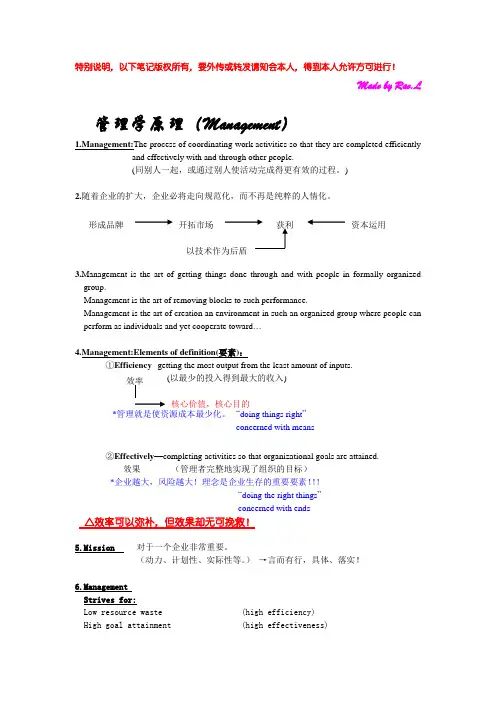
特别说明,以下笔记版权所有,要外传或转发请知会本人,得到本人允许方可进行!Made by Rae.L管理学原理(Management ) 1.Management:The process of coordinating work activities so that they are completed efficientlyand effectively with and through other people.(同别人一起,或通过别人使活动完成得更有效的过程。
)2.随着企业的扩大,企业必将走向规范化,而不再是纯粹的人情化。
3.Management is the art of getting things done through and with people in formally organized group.Management is the art of removing blocks to such performance.Management is the art of creation an environment in such an organized group where people can perform as individuals and yet cooperate toward …4.Management:Elements of definition(要素):①Efficiency --getting the most output from the least amount of inputs.(以最少的投入得到最大的收入)②Effectively —completing activities so that organizational goals are attained.效果 (管理者完整地实现了组织的目标)*企业越大,风险越大!理念是企业生存的重要要素!!!--“doing the right things ”--concerned with ends △效率可以弥补,但效果却无可挽救!5.Mission 对于一个企业非常重要。
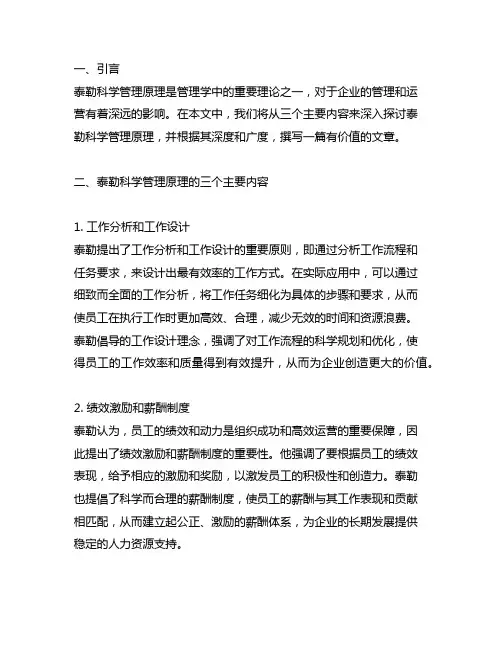
一、引言泰勒科学管理原理是管理学中的重要理论之一,对于企业的管理和运营有着深远的影响。
在本文中,我们将从三个主要内容来深入探讨泰勒科学管理原理,并根据其深度和广度,撰写一篇有价值的文章。
二、泰勒科学管理原理的三个主要内容1. 工作分析和工作设计泰勒提出了工作分析和工作设计的重要原则,即通过分析工作流程和任务要求,来设计出最有效率的工作方式。
在实际应用中,可以通过细致而全面的工作分析,将工作任务细化为具体的步骤和要求,从而使员工在执行工作时更加高效、合理,减少无效的时间和资源浪费。
泰勒倡导的工作设计理念,强调了对工作流程的科学规划和优化,使得员工的工作效率和质量得到有效提升,从而为企业创造更大的价值。
2. 绩效激励和薪酬制度泰勒认为,员工的绩效和动力是组织成功和高效运营的重要保障,因此提出了绩效激励和薪酬制度的重要性。
他强调了要根据员工的绩效表现,给予相应的激励和奖励,以激发员工的积极性和创造力。
泰勒也提倡了科学而合理的薪酬制度,使员工的薪酬与其工作表现和贡献相匹配,从而建立起公正、激励的薪酬体系,为企业的长期发展提供稳定的人力资源支持。
3. 工作方法和工作标准化泰勒强调了工作方法和工作标准化的重要性,认为通过科学规划和精细管理,能够使工作过程更加精准、可控。
他提倡了标准化的工作流程和作业方式,以确保员工在执行工作时能够按照固定的程序和标准进行,避免出现不确定性和浪费。
泰勒也注重工作方法的改进和创新,鼓励员工积极参与工作方式的优化和提升,以不断提高工作效率和质量,推动企业的持续改善和发展。
三、结论与个人观点通过对泰勒科学管理原理的三个主要内容的深入探讨,我们可以看到其在企业管理中的重要性和实际应用价值。
工作分析和工作设计能够使员工工作更加有效,绩效激励和薪酬制度能够激发员工的动力和创造力,工作方法和工作标准化能够使工作过程更加规范和可控。
这些原理对于企业的管理和运营至关重要,可以帮助企业实现高效、稳定的运转,从而取得更好的经济效益和社会效益。
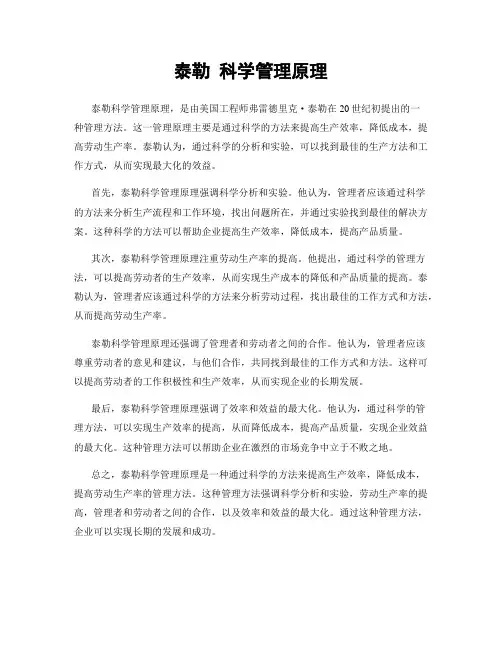
泰勒科学管理原理泰勒科学管理原理,是由美国工程师弗雷德里克·泰勒在20世纪初提出的一种管理方法。
这一管理原理主要是通过科学的方法来提高生产效率,降低成本,提高劳动生产率。
泰勒认为,通过科学的分析和实验,可以找到最佳的生产方法和工作方式,从而实现最大化的效益。
首先,泰勒科学管理原理强调科学分析和实验。
他认为,管理者应该通过科学的方法来分析生产流程和工作环境,找出问题所在,并通过实验找到最佳的解决方案。
这种科学的方法可以帮助企业提高生产效率,降低成本,提高产品质量。
其次,泰勒科学管理原理注重劳动生产率的提高。
他提出,通过科学的管理方法,可以提高劳动者的生产效率,从而实现生产成本的降低和产品质量的提高。
泰勒认为,管理者应该通过科学的方法来分析劳动过程,找出最佳的工作方式和方法,从而提高劳动生产率。
泰勒科学管理原理还强调了管理者和劳动者之间的合作。
他认为,管理者应该尊重劳动者的意见和建议,与他们合作,共同找到最佳的工作方式和方法。
这样可以提高劳动者的工作积极性和生产效率,从而实现企业的长期发展。
最后,泰勒科学管理原理强调了效率和效益的最大化。
他认为,通过科学的管理方法,可以实现生产效率的提高,从而降低成本,提高产品质量,实现企业效益的最大化。
这种管理方法可以帮助企业在激烈的市场竞争中立于不败之地。
总之,泰勒科学管理原理是一种通过科学的方法来提高生产效率,降低成本,提高劳动生产率的管理方法。
这种管理方法强调科学分析和实验,劳动生产率的提高,管理者和劳动者之间的合作,以及效率和效益的最大化。
通过这种管理方法,企业可以实现长期的发展和成功。
科学管理原理阅读计划英文回答:Scientific management principles are a set ofprinciples and techniques that aim to improve efficiency and productivity in the workplace. These principles were first introduced by Frederick Taylor in the late 19th and early 20th centuries and have since been widely adopted by organizations around the world.One of the key principles of scientific management is the division of labor. This principle suggests that work should be divided into small, specialized tasks, with each worker assigned to a specific task. By doing so, workers can become highly skilled and efficient in their assigned tasks, leading to increased productivity. For example, in a manufacturing company, workers may be divided intodifferent teams, each responsible for a specific step in the production process. This division of labor allows each team to focus on their specific task, leading to faster andmore efficient production.Another important principle of scientific management is the use of time and motion studies. This involves analyzing and optimizing the movements and actions required to complete a task. By identifying and eliminating unnecessary or inefficient movements, workers can perform their tasks more quickly and effectively. For instance, in a restaurant kitchen, a time and motion study may reveal that rearranging the layout of the kitchen and placing commonly used ingredients within easy reach can significantly reduce the time it takes for chefs to prepare a dish.Furthermore, scientific management principles emphasize the use of standardized procedures and processes. This ensures consistency and reduces variation in the way tasks are performed. By following standardized procedures, organizations can achieve higher levels of quality and efficiency. For example, in a customer service call center, agents may be required to follow a standardized script when interacting with customers. This ensures that all customers receive the same level of service and that importantinformation is consistently communicated.In addition, scientific management principles promote the use of scientific methods to analyze and solve problems. This involves collecting data, conducting experiments, and using statistical analysis to make informed decisions. By using a scientific approach, organizations can identify the root causes of problems and develop effective solutions.For instance, a retail store may use data analysis toidentify trends in customer purchasing behavior and adjust their inventory accordingly to meet customer demand.Overall, scientific management principles provide a systematic and scientific approach to managing andimproving workplace efficiency. By implementing these principles, organizations can increase productivity, reduce waste, and achieve higher levels of quality and customer satisfaction.中文回答:科学管理原理是一套旨在提高工作效率和生产力的原则和技术。
年正值管理学奠基者弗雷德里克.温斯洛.泰勒(Frederick Winslow Taylor) 发表《科学管理原理》一百周年。
百年来,泰勒所创立的科学管理理论随着时代变迁,在理论形式、内容以及实践等各个层面得到了不断丰富、完善和创新。
科学管理的理论体系成为工业化时代最为重要的思想遗产。
理论确立 以效率为核心19世纪末,处于工业革命时期的美国经济开始腾飞。
但此时的美国企业普遍存在“磨洋工”等效率低下的情况。
19世纪80年代开始,作为企业中层的泰勒先后在米德维尔钢铁公司(Midvale Steel Works) 和伯利恒钢铁公司 (Bethlehem Steel Corp) 的车间里开始了对“工作”的研究。
在对“金属切削”、“搬运铁块”和“铲掘”等持续近30年的实验研究以及众多企业家的实践中,泰勒探索出一系列科学管理的规律,于1911年以《科学管理原理》为名出版。
或许泰勒自己也没有想到,此书会成为管理思想和管理学发展的标志性事件。
在这划时代之作中,泰勒对科学管理理论进行了深入浅出的论证。
他指出,科学管理的基础在于:雇主与雇员的真正利益是一致的;如果没有实现雇员财富最大化,就不可能永久地实现雇科学管理百年路文/巫云仙巫云仙:中国政法大学商学院教授2011管理史鉴主财富最大化,反之亦然。
同时实现工人的高薪酬和雇主的低成本是可能的。
总之,财富最大化只能是生产率最大化的结果。
泰勒认为,科学管理原理有四个基本要素组成:形成一门真正的管理科学;科学地选择工人;对工人进行教育和培养;管理者与工人之间要亲密友好地合作。
正是各个要素的集成,而不是单个要素,才能构成科学管理。
他反复强调,科学管理需要的是:科学,而不是单凭经验的方法;协调,而不是分歧;合作,而不是个人主义;最大的产出,而不是有限制的产出;实现每个人的劳动效率最大化,富裕最大化,而不是贫困。
任务和奖金构成科学管理机制的两个重要因素。
管理者与工人之间的职责几乎是均分的,摆在管理者面前的问题就是如何最大限度地发挥每个工人的“积极性”,管理者必须给予工人以一般企业所没有的“特殊激励”。
The Principles of Scientific Management(1911)by Frederick Winslow Taylor, M.E., Sc.D.IntroductionChapter I: Fundamentals of Scientific ManagementChapter II: The Principles of Scientific ManagementINTRODUCTIONPresident Roosevelt, in his address to the Governors at the White House, prophetically remarked that "The conservation of our national resources is only preliminary to the larger question of national efficiency."The whole country at once recognized the importance of conserving our material resources and a large movement has been started which will be effective in accomplishing this object. As yet, however, we have but vaguely appreciated the importance of "the larger question of increasing our national efficiency."We can see our forests vanishing, our water-powers going to waste,our soil being carried by floods into the sea; and the end of ourcoal and our iron is in sight. But our larger wastes of human effort, which go on every day through such of our acts as are blundering,ill-directed, or inefficient, and which Mr Roosevelt refers to as a lack of "national efficiency," are less visible, less tangible, and are but vaguely appreciated.We can see and feel the waste of material things. Awkward,inefficient, or ill-directed movements of men, however, leave nothing visible or tangible behind them. Their appreciation calls for an act of memory, an effort of the imagination. And for this reason, even though our daily loss from this source is greater than from our waste of material things, the one has stirred us deeply, while the other has moved us but little.As yet there has been no public agitation for "greater national efficiency," no meetings have been called to consider how this is to be brought about. And still there are signs that the need for greater efficiency is widely felt.The search for better, for more competent men, from the presidents of our great companies down to our household servants, was never more vigorous than it is now. And more than ever before is the demand for competent men in excess of the supply.What we are all looking for, however, is the ready-made, competent man; the man whom some one else has trained. It is only when we fully realize that our duty, as well as our opportunity, lies insystematically cooperating to train and to make this competent man, instead of in hunting for a man whom some one else has trained, that we shall be on the road to national efficiency.In the past the prevailing idea has been well expressed in the saying that "Captains of industry are born, not made" and the theory hasbeen that if one could get the right man, methods could be safelyleft to him. In the future it will be appreciated that our leaders must be trained right as well as born right, and that no great mancan (with the old system of personal management) hope to compete with a number of ordinary men who have been properly organized so as efficiently to cooperate.In the past the man has been first; in the future the system must be first. This in no sense, however, implies that great men are not needed. On the contrary, the first object of any good system must be that of developing first-class men; and under systematic managementthe best man rises to the top more certainly and more rapidly thanever before.This paper has been written:First. To point out, through a series of simple illustrations, the great loss which the whole country is suffering through inefficiencyin almost all of our daily acts.Second. To try to convince the reader that the remedy for this inefficiency lies in systematic management, rather than in searching for some unusual or extraordinary man.Third. To prove that the best management is a true science, resting upon clearly defined laws, rules, and principles, as a foundation.And further to show that the fundamental principles of scientific management are applicable to all kinds of human activities, from our simplest individual acts to the work of our great corporations, which call for the most elaborate cooperation. And, briefly, through aseries of illustrations, to convince the reader that whenever these principles are correctly applied, results must follow which are truly astounding.This paper was originally prepared for presentation to The American Society of Mechanical Engineers. The illustrations chosen are such as, it is believed, will especially appeal to engineers and to managersof industrial and manufacturing establishments, and also quite asmuch to all of the men who are working in these establishments. It is hoped, however, that it will be clear to other readers that the same principles can be applied with equal force to all social activities:to the management of our homes; the management of our farms; the management of the business of our tradesmen, large and small; of our churches, our philanthropic institutions, our universities, and our governmental departments.CHAPTER I: FUNDAMENTALS OF SCIENTIFIC MANAGEMENTTHE principal object of management should be to secure the maximum prosperity for the employer, coupled with the maximum prosperity for each employee.The words "maximum prosperity" are used, in their broad sense, tomean not only large dividends for the company or owner, but the development of every branch of the business to its highest state of excellence, so that the prosperity may be permanent.In the same way maximum prosperity for each employee means not only higher wages than are usually received by men of his class, but, of more importance still, it also means the development of each man tohis state of maximum efficiency, so that he may be able to do,generally speaking, the highest grade of work for which his natural abilities fit him, and it further means giving him, when possible,this class of work to do.It would seem to be so self-evident that maximum prosperity for the employer, coupled with maximum prosperity for the employee, ought to be the two leading objects of management, that even to state thisfact should be unnecessary. And yet there is no question that, throughout the industrial world, a large part of the organization of employers, as well as employees, is for war rather than for peace,and that perhaps the majority on either side do not believe that itis possible so to arrange their mutual relations that their interests become identical.The majority of these men believe that the fundamental interests of employees and employers are necessarily antagonistic Scientific management, on the contrary, has for its very foundation the firm conviction that the true interests of the two are one and the same; that prosperity for the employer cannot exist through a long term of years unless it is accompanied by prosperity for the employee, andvice versa; and that it is possible to give the workman what he most wants high wages and the employer what he wants a low labor cost --for his manufactures.It is hoped that some at least of those who do not sympathize with each of these objects may be led to modify their views; that some employers, whose attitude toward their workmen has been that oftrying to get the largest amount of work out of them for the smallest possible wages, may be led to see that a more liberal policy toward their men will pay them better; and that some of those workmen who begrudge a fair and even a large profit to their employers, and who feel that all of the fruits of their labor should belong to them, and that those for whom they work and the capital invested in thebusiness are entitled to little or nothing, may be led to modifythese views.No one can be found who will deny that in the case of any single individual the greatest prosperity can exist only when thatindividual has reached his highest state of efficiency; that is, when he is turning out his largest daily output.The truth of this fact is also perfectly clear in the case of two men working together. To illustrate: if you and your workman have become so skilful that you and he together are making two pairs of shoes ina day, while your competitor and his workman are making only one pair, it is clear that after selling your two pairs of shoes you can payyour workman much higher wages than your competitor who produces only one pair of shoes is able to pay his man, and that there will stillbe enough money left over for you to have a larger profit than your competitor.In the case of a more complicated manufacturing establishment, it should also be perfectly clear that the greatest permanent prosperity for the workman, coupled with the greatest prosperity for the employer, can be brought about only when the work of theestablishment is done with the smallest combined expenditure of human effort, plus nature's resources, plus the cost for the use of capital in the shape of machines, buildings, etc. Or, to state the same thing in a different way: that the greatest prosperity can exist only asthe result of the greatest possible productivity of the men and machines of the establishment that is, when each man and each machine are turning out the largest possible output; because unless your men and your machines are daily turning out more work than others around you, it is clear that competition will prevent your paying higher wages to your workmen than are paid to those of your competitor. And what is true as to the possibility of paying high wages in the caseof two companies competing close beside one another is also true asto whole districts of the country and even as to nations which are in competition. In a word, that maximum prosperity can exist only as the result of maximum productivity. Later in this paper illustrationswill be given of several companies which are earning large dividends and at the same time paying from 30 per cent to 100 per cent higher wages to their men than are paid to similar men immediately around them, and with whose employers they are in competition. These illustrations will cover different types of work, from the most elementary to the most complicated.If the above reasoning is correct, it follows that the most important object of both the workmen and the management should be the training and development of each individual in the establishment, so that he can do (at his fastest pace and with the maximum of efficiency) the highest class of work for which his natural abilities fit him.These principles appear to be so self-evident that many men may think it almost childish to state them. Let us, however, turn to the facts, as they actually exist in this country and in England. The Englishand American peoples are the greatest sportsmen in the world.Whenever an American workman plays baseball, or an English workman plays cricket, it is safe to say that he strains every nerve tosecure victory for his side. He does his very best to make thelargest possible number of runs. The universal sentiment is so strong that any man who fails to give out all there is in him in sport is branded as a "quitter," and treated with contempt by those who are around him.When the same workman returns to work on the following day, insteadof using every effort to turn out the largest possible amount of work, in a majority of the cases this man deliberately plans to do aslittle as he safely can -- to turn out far less work than he is well able to do -- in many instances to do not more than one-third to one-half of a proper day's work. And in fact if he were to do his best to turn out his largest possible day's work, he would be abused by his fellow-workers for so doing, even more than if he had proved himselfa "quitter" in sport. Under working, that is, deliberately working slowly so as to avoid doing a full day's work, "soldiering," as it is called in this country, "hanging it out," as it is called in England,"ca' cannie," as it is called in Scotland, is almost universal in industrial establishments, and prevails also to a large extent in the building trades; and the writer asserts without fear of contradiction that this constitutes the greatest evil with which the working-people of both England and America are now afflicted.It will be shown later in this paper that doing away with slowworking and "soldiering" in all its forms and so arranging the relations between employer and employee that each workman will workto his very best advantage and at his best speed, accompanied by the intimate cooperation with the management and the help (which the workman should receive) from the management, would result on the average in nearly doubling the output of each man and each machine. What other reforms, among those which are being discussed by these two nations, could do as much toward promoting prosperity, toward the diminution of poverty, and the alleviation of suffering? America and England have been recently agitated over such subjects as the tariff, the control of the large corporations on the one hand, and of hereditary power on the other hand, and over various more or less socialistic proposals for taxation, etc. On these subjects both peoples have been profoundly stirred, and yet hardly a voice has been raised to call attention to this vastly greater and more important subject of "soldiering," which directly and powerfully affects the wages, the prosperity, and the life of almost every working-man, and also quite as much the prosperity of every industrial establishmentin the nation.The elimination of "soldiering" and of the several causes of slow working would so lower the cost of production that both our home and foreign markets would be greatly enlarged, and we could compete on more than e en terms with our rivals. It would remove one of the fundamental causes for dull times, for lack of employment, and for poverty, and therefore would have a more permanent and far-reaching effect upon these misfortunes than any of the curative remedies that are now being used to soften their consequences. It would insure higher wages and make shorter working hours and better working and home conditions possible.Why is it, then, in the face of the self-evident fact that maximum prosperity can exist only as the result of the determined effort of each workman to turn out each day his largest possible day's work, that the great majority of our men are deliberately doing just the opposite, and that even when the men have the best of intentionstheir work is in most cases far from efficient?There are three causes for this condition, which may be briefly summarized as:First. The fallacy, which has from time immemorial been almost universal among workmen, that a material increase in the output of each man or each machine in the trade would result in the end in throwing a large number of men out of work.Second. The defective systems of management which are in common use, and which make it necessary for each workman to soldier, or work slowly, in order that he may protect his own best interests.Third. The inefficient rule-of-thumb methods, which are still almost universal in all trades and in practising which our workmen waste a large part of their effort.This paper will attempt to show the enormous gains which would result from the substitution by our workmen of scientific for rule-of-thumb methods.To explain a little more fully these three causes:First. The great majority of workmen still believe that if they wereto work at their best speed they would be doing a great injustice to the whole trade by throwing a lot of men out of work, and yet the history of the development of each trade shows that each improvement, whether it be the invention of a new machine or the introduction of a better method, which results in increasing the productive capacity of the men in the trade and cheapening the costs, instead of throwingmen out of work make in the end work for more men.The cheapening of any article in common use almost immediatelyresults in a largely increased demand for that article. Take the case of shoes, for instance. The introduction of machinery for doing every element of the work which was formerly done by hand has resulted in making shoes at a fraction of their former labor cost, and in selling them so cheap that now almost every man, woman, and child in the working-classes buys one or two pairs of shoes per year, and wears shoes all the time, whereas formerly each workman bought perhaps one pair of shoes every five years, and went barefoot most of the time, wearing shoes only as a luxury or as a matter of the sternest necessity. In spite of the enormously increased output of shoes per workman, which has come with shoe machinery, the demand for shoes has so increased that there are relatively more men working in the shoe industry now than ever before.The workmen in almost every trade have before them an object lessonof this kind, and yet, because they are ignorant of the history oftheir own trade even, they still firmly believe, as their fathers did before them, that it is against their best interests for each man to turn out each day as much work as possible.Under this fallacious idea a large proportion of the workmen of both countries each day deliberately work slowly so as to curtail the output. Almost every labor union has made, or is contemplating making, rules which have for their object curtailing the output of their members, and those men who have the greatest influence with theworking-people, the labor leaders as well as many people with philanthropic feelings who are helping them, are daily spreading this fallacy and at the same time telling them that they are overworked.A great deal has been and is being constantly said about "sweat-shop" work and conditions. The writer has great sympathy with those who are overworked, but on the whole a greater sympathy for those who areunder paid. For every individual, however, who is overworked, thereare a hundred who intentionally underwork -- greatly underwork --every day of their lives, and who for this reason deliberately aid in establishing those conditions which in the end inevitably result inlow wages. And yet hardly a single voice is being raised in anendeavor to correct this evil.As engineers and managers, we are more intimately acquainted withthese facts than any other class in the community, and are therefore best fitted to lead in a movement to combat this fallacious idea by educating not only the workmen but the whole of the country as to the true facts. And yet we are practically doing nothing in thisdirection, and are leaving this field entirely in the hands of the labor agitators (many of whom are misinformed and mis-guided), and of sentimentalists who are ignorant as to actual working conditions.Second. As to the second cause for soldiering -- the relations which exist between employers and employees under almost all of the systems of management which are in common use -- it is impossible in a few words to make it clear to one not familiar with this problem why itis that the ignorance of employers as to the proper time in whichwork of various kinds should be done makes it for the interest of the workman to "soldier."The writer therefore quotes herewith from a paper read before The American Society of Mechanical Engineers. in June, 1903, entitled "Shop Management," which it is hoped will explain fully this causefor soldiering:"This loafing or soldiering proceeds from two causes. First, from the natural instinct and tendency of men to take it easy, which may be called natural soldiering. Second, from more intricate second thought and reasoning caused by their relations with other men, which may be called systematic soldiering."There is no question that the tendency of the average man (in all walks of life) is toward working at a slow, easy gait, and that it is only after a good deal of thought and observation on his part or as a result of example, conscience, or external pressure that he takes a more rapid pace."There are, of course, men of unusual energy, vitality, and ambition who naturally choose the fastest gait, who set up their own standards, and who work hard, even though it may be against their best interests. But these few uncommon men only serve by forming a contrast to emphasize the tendency of the average."This common tendency to 'take it easy' is greatly increased bybringing a number of men together on similar work and at a uniform standard rate of pay by the day."Under this plan the better men gradually but surely slow down their gait to that of the poorest and least efficient. When a naturally energetic man works for a few days beside a lazy one, the logic ofthe situation is unanswerable. 'Why should I work hard when that lazy fellow gets the same pay that I do and does only half as much work?'"A careful time study of men working under these conditions will disclose facts which are ludicrous as well as pitiable."To illustrate: The writer has timed a naturally energetic workman who, while going and coming from work, would walk at a speed of from three to four miles per hour, and not infrequently trot home after a day's work. On arriving at his work he would immediately slow down to a speed of about one mile an hour. When, for example, wheeling aloaded wheelbarrow, he would go at a good fast pace even uphill inorder to be as short a time as possible under load, and immediately on the return walk slow down to a mile an hour, improving every opportunity for delay short of actually sitting down. In order to be sure not to do more than his lazy neighbor, he would actually tire himself in his effort to go slow."These men were working under a foreman of good reputation and highly thought of by his employer, who, when his attention was called tothis state of things, answered: 'Well, I can keep them from sitting down, but the devil can't make them get a move on while they are at work.'"The natural laziness of men is serious, but by far the greatest evil from which both workmen and employers are suffering is the systematic soldiering which is almost universal under all of the ordinary schemes of management and which results from a careful study on the part of the workmen of what will promote their best interests."The writer was much interested recently in hearing one small but experienced golf caddy boy of twelve explaining to a green caddy, who had shown special energy and interest, the necessity of going slow and lagging behind his man when he came up to the ball, showing him that since they were paid by the hour, the faster they went the less money they got, and finally telling him that if he went too fast the other boys would give him a licking."This represents a type of systematic soldiering which is not, however, very serious, since it is done with the knowledge of the employer, who can quite easily break it up if he wishes."The greater part of the systematic soldiering, however, is done by the men with the deliberate object of keeping their employersignorant of how fast work can be done."So universal is soldiering for this purpose that hardly a competent workman can be found in a large establishment, whether he works bythe day or on piece work, contract work, or under any of the ordinary systems, who does not devote a considerable part of his time to studying just how slow he can work and still convinc6 his employer that he is going at a good pace."The causes for this are, briefly, that practically all employers determine upon a maximum sum which they feel it is right for each of their classes of employees to earn per day, whether their men work by the day or piece."Each workman soon finds out about what this figure is for his particular case, and he also realizes that when his employer is convinced that a man is capable of doing more work than he has done, he will find sooner or later some way of compelling him to do it with little or no increase of pay."Employers derive their knowledge of how much of a given class of work can be done in a day from either their own experience, which has frequently grown hazy with age, from casual and unsystematic observation of their men, or at best from records which are kept, showing the quickest time in which each job has been done. In many cases the employer will feel almost certain that a given job can be done faster than it has been, but he rarely cares to take the drasticmeasures necessary to force men to do it in the quickest time, unless he has an actual record proving conclusively how fast the work can be done."It evidently becomes for each man's interest, then, to see that nojob is done faster than it has been in the past. The younger and less experienced men are taught this by their elders, and all possible persuasion and social pressure is brought to bear upon the greedy and selfish men to keep them from making new records which result in temporarily increasing their wages, while all those who come after them are made to work harder for the same old pay."Under the best day work of the ordinary type, when accurate records are kept of the amount of work done by each man and of his efficiency, and when each man's wages are raised as he improves, and those whofail to rise to a certain standard are discharged and a fresh supplyof carefully selected men are given work in their places, both the natural loafing and systematic soldiering can be largely broken up. This can only be done, however, when the men are thoroughly convinced that there is no intention of establishing piece work even in the remote future, and it is next to impossible to make men believe this when the work is of such a nature that they believe piece work to be practicable. In most cases their fear of making a record which willbe used as a basis for piece work will cause them to soldier as much as they dare."It is, however, under piece work that the art of systematicsoldiering is thoroughly developed; after a workman has had the price per piece of the work he is doing lowered two or three times as aresult of his having worked harder and increased his output, he is likely entirely to lose sight of his employer's side of the case and become imbued with a grim determination to have no more cuts if soldiering can prevent it. Unfortunately for the character of the workman, soldiering involves a deliberate attempt to mislead and deceive his employer, and thus upright and straightforward workmenare compelled to become more or less hypocritical. The employer is soon looked upon as an antagonist, if not an enemy, and the mutual confidence which should exist between a leader and his men, the enthusiasm, the feeling that they are all working for the same endand will share in the results is entirely lacking."The feeling of antagonism under the ordinary piece-work system becomes in many cases so marked on the part of the men that any proposition made by their employers, however reasonable, is looked upon with suspicion, and soldiering becomes such a fixed habit that men will frequently take pains to restrict the product of machines which they are running when even a large increase in output would involve no more work on their part."Third. As to the third cause for slow work, considerable space will later in this paper be devoted to illustrating the great gain, bothto employers and employees, which results from the substitution of scientific for rule-of-thumb methods in even the smallest details of the work of every trade. The enormous saving of time and therefore increase in the output which it is possible to effect througheliminating unnecessary motions and substituting fast for slow and inefficient motions for the men working in any of our trades can be fully realized only after one has personally seen the improvementwhich results from a thorough motion and time study, made by a competent man.。